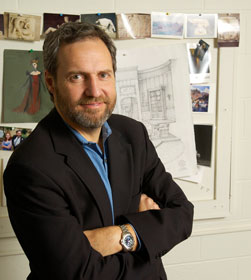  |
| HOME | THIS ISSUE | CALENDAR | GRANTS | BACK ISSUES | < BACK | NEXT > |
English’s The Olive Grove presented during festival of plays- September 18, 2006 |
||||
|
A staged reading of a new play written by the head of the dramatic arts department was presented recently at Shakespeare & Company's Studio Festival of Plays. Gary English's The Olive Grove was part of a mini-marathon of new and published plays on Sept. 3 at the Founders' Theatre in Lenox, Mass. Five productions were presented throughout the day as works-in-progress and staged readings. The festival provides an opportunity - with minimal production elements - for the company's actors, directors, and writers to explore and develop new works or plays that may be presented during a future season. The Olive Grove was inspired by the historical invasion of Melos and Thucydides' Melian Dialogue, a classical Greek work portraying a conversation between Athenian generals and Melian magistrates. The play examines what happened to the Athenians as a result of losing their moral footing, and the effect on their democratic institutions. It also involves a story of a family in Melos caught in the tragedy. The dialogue piqued English's interest because of parallels with America's role in the world today. The Athenians laid siege to Melos, an island oligarchy 100 miles off the coast of Greece that was aligned with Sparta, an enemy of Athens. Eventually, the people of the island were killed or sold into slavery - in the name of spreading democracy. Over the past 12 years, the Studio Festival of Plays has presented many works that subsequently were given full productions during the company's regular season, including Mrs. Klein; Fortune and Misfortune; Laughing Wild; and The Turn of the Screw. "I think it's really important for a classical theater company to make new work a top priority," says Michael Hammond, associate artistic director of Shakespeare & Company. "Shakespeare's plays have proved timeless, but he was an extraordinarily popular playwright in his own time because he chronicled that time with such breadth and vitality," adds Hammond. "We take inspiration from his example, and are looking for the plays that chronicle our own time to teach us more about who we are today, or what we are becoming."
|
| ADVANCE HOME UCONN HOME |

